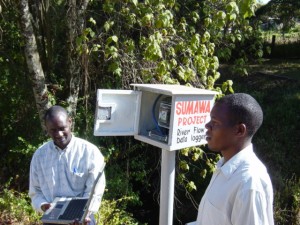Building the Technical and
Institutional Capacity to Feed the World
To solve the puzzle of sustainably producing more food and feed for tomorrow under conditions of increasing resource scarcity it is critical to build the knowledge and skills of actors in the global food system today. This task has been undertaken by the Collaborative Research Support Programs or CRSPs who are world leaders in offering scientific training to students from the U.S. and developing countries. Jointly funded by USAID, U.S. universities, and other partners, the CRSPs have not only supported students in degree programs but also faculty research and the professional development of many agricultural practitioners. They have also trained many thousands of producers in field schools, training programs, and exchange visits. Overall, about one-fourth of CRSP budgets are allocated to training.
From 1978 to 2011, a total of at least 3,791 students received funding under CRSP activities to obtain at least 3,820 degrees (some students were supported for multiple degrees).* By current best estimates, 30 percent of these degrees were PhDs, 40 percent were MSc/MA, and 20 percent were BS degrees, with no reporting on 10 percent. By conservative estimates, if each of these students went on to teach, train, or mentor even 100 other students, farmers, or agricultural development professionals, they will have assisted about 380,000 people.
These students came from 130 countries, with 25 percent coming from sub-Saharan Africa, 23 percent from the U.S., 22 percent from Latin America and the Caribbean, and 21 percent from Asia, 2 percent from Europe and Eurasia, 2 percent from the Middle East and 5 percent not reporting. They studied in 36 of the 50 states, with the top four being Texas, Indiana, Nebraska, and Kansas.
Their degrees have been granted in dozens of scientific fields, from agronomy, entomology, and food science, to agricultural economics and other social sciences.
The CRSPs have also created lasting relationships between U.S. and developing country universities such as with Moi and Egerton Universities in Kenya, Ahmadou Bello University in Nigeria, and the University of Philippines, Los Baños in the Philippines.
Many CRSP graduates have gone on to have the authority to shape agricultural programs and policies in international and national institutions. A graduate of the former Bean/Cowpea CRSP, Augustine Langyintuo, now heads the Policy Program of the Alliance for a Green Revolution in Africa (AGRA), an African-led organization that supports sustainable and profitable smallholder farming in Africa. He is joined by Margaret Kroma, a SANREM CRSP graduate, who is the Gender Advisor for the Policy Program and contributes to gender integration across the institution.
*Data are missing for a few years for a few CRSPs.
Building the Technical and Institutional Capacity to Feed the World

